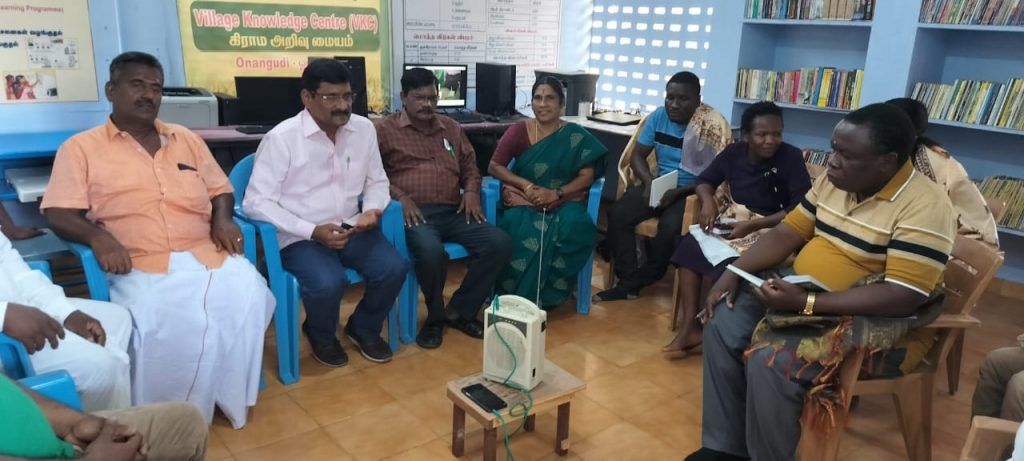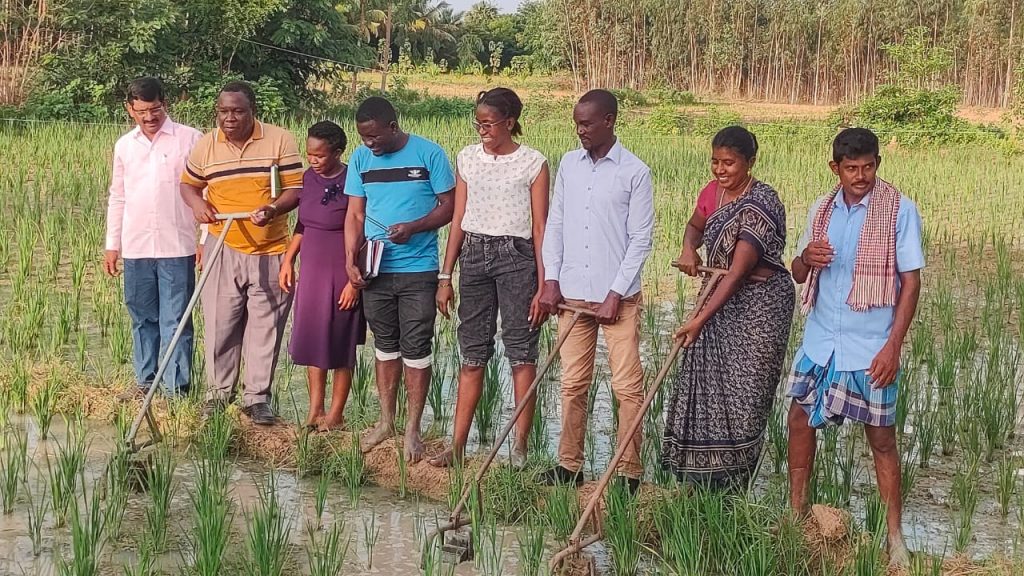Tanzania scientists visit India in July 2023






Officials from Tanzania Agriculture Research Institute (TARI) visited India from July 15 to 20, 2023, as part of the project on Institutional Capacity Building for Climate-Resilient Rice Production, supported by the Ministry of Foreign Affairs and the National Institute of Bioeconomy in Norway. The team included the following members.
1. Dr. Atugonza Bilaro – Principal Research Scientist
2. Dr. Furahisha Miraj – Research Officer
3. Mrs. Fabiola Langa – Assistant Research Officer
4. Miss Atwebembela Kasenene – Irrigation Engineer
5. Daniel Dawson – Assistant Field Officer
The purpose of the visit was to learn and understand the System of Rice Intensification (SRI) method of paddy cultivation for adoption in Tanzania. They also aimed to comprehend the M.S. Swaminathan Research Foundation (MSSRF) model of Village Resource Centers (VRC), Village Knowledge Centers (VKC), and the Plant Clinic programme. Additionally, they sought to gain insights into various aspects of rice cultivation practices, rice varieties, the seed supply system, price issues, and how climate-smart rice seeds are made accessible to smallholders by both the government and private sectors.
During their visit, the team explored the SRI rice-growing region in Thanjavur, Tamil Nadu. They observed demonstrations of machine transplantation in the field, interacted with farmers, and learned about precision nitrogen management using the Leaf Color Chart (LCC). Furthermore, they gained insights into Integrated Pest Management (IPM) practices in rice and research on seed access and supply of climate-smart rice varieties to smallholders in Tamil Nadu. The team also received training on nutrient management in rice, including micronutrients.
Following their Thanjavur visit, they travelled to the SRI rice-growing fields in Pudukkottai district. Here, they had the opportunity to observe the transportation of seedlings from the Mat Nursery to the main field and witnessed the SRI method of transplantation, which involved the use of conoweeders for weeding. The team also visited Village Knowledge Centers (VKCs) to understand their services and activities, including the use of modern Information Communication Technologies (ICTs) to connect farmers and experts for real-time solutions to agricultural issues. They witnessed demonstrations of ICT interventions through VKCs and interacted with male and female users, Village Management Committee (VMC) members of the VKCs, and stakeholders. Additionally, the team observed live plant clinic sessions, which addressed plant health issues through innovative agricultural extension methods and proper diagnosis using various diagnostic tools, including a digital microscope.
The team also visited Farmers’ Producer Organizations (FPOs) and interacted with directors to understand their activities, as well as visiting farmers’ fields. They held meetings with stakeholders, including the Department of Agriculture, Horticulture, Farmers, FPO members, and NGOs. After the field visits, the team met with the District Collector, who explained the various agricultural and developmental schemes being implemented in the district.
Concluding their field visits, the team visited the MSSRF office in Chennai. Their visit ended with a debriefing meeting and a discussion on the way forward.
The visit was facilitated by the Dr. R. Rajkumar, Principal Scientist, MSSRF and his team and Dr. V R Saminathan, Prof. Entomology, Tamil Nadu Agriculture University.
Dr. Atugonza Bilaro – Principal Research Scientist, TARI expressed, the knowledge and skills acquired by the TARI research team through practical demonstrations of key SRI principles such as mat nursery, machine transplanting, cono weeder for weeding operations, precision nitrogen management using LCC, alternate wet and drying (AWD), VKCs, and the plant clinic program are not only crucial for the successful implementation of the “Institutional capacity building on climate-smart and resource-efficient rice production (with a focus on the System of Rice Intensification)” project, but they also complement the efforts made by TARI and the government to enhance the capacity of its human resources in addressing the adverse effects of climate change. These efforts aim to promote sustainable intensification of rice production, ultimately contributing to a sustainable, nutritious, and healthy transformation of the agri-food system. Thanks to M S Swaminathan Research Foundation for this wonderful learning opportunity.
Tanzania visit press coverage (pdf)
Text and photos: MSSRF